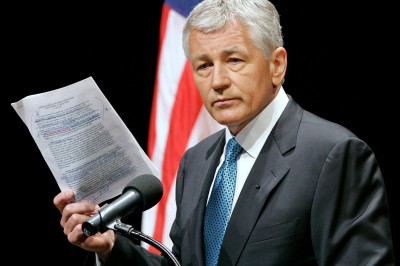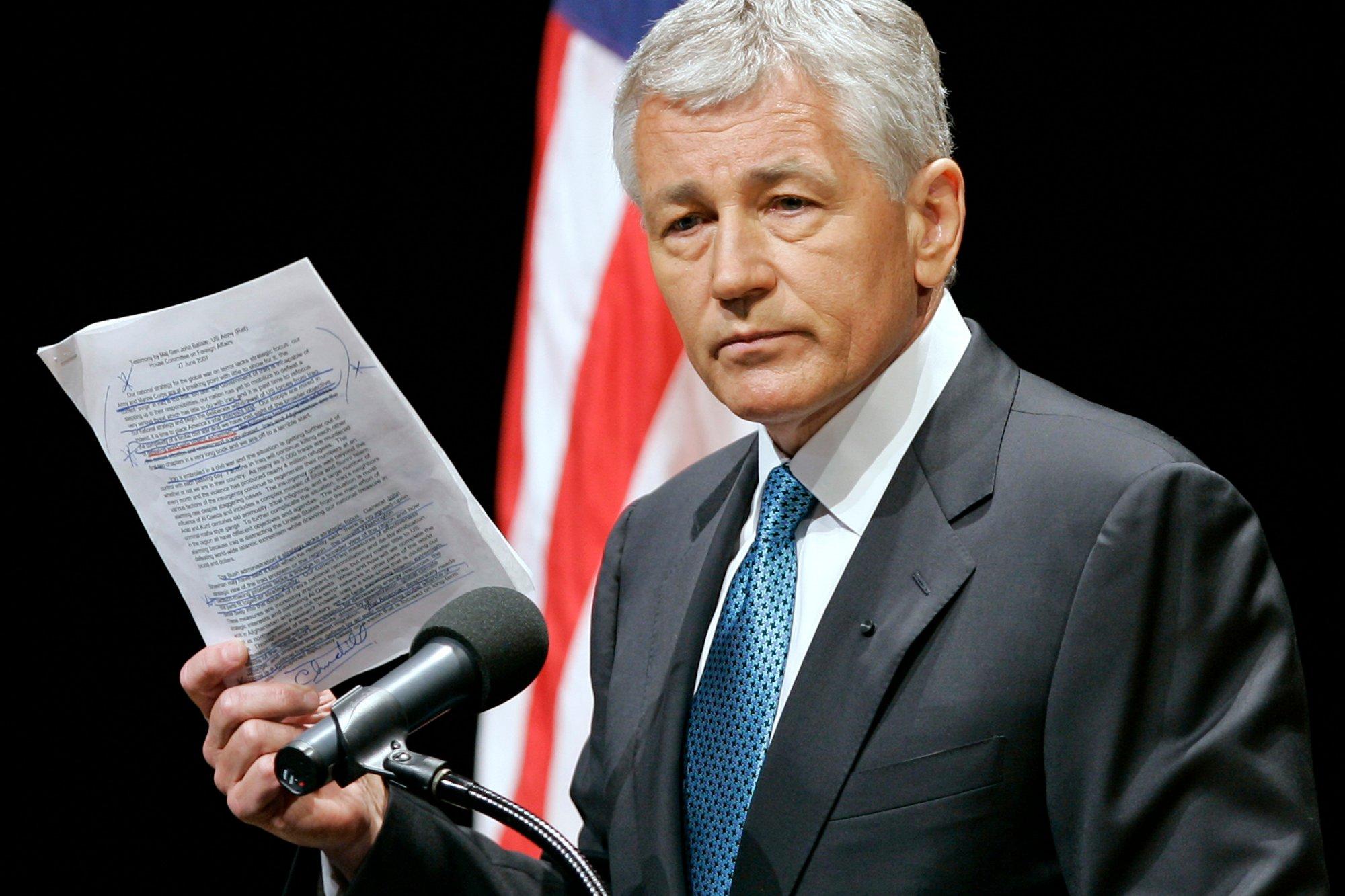 With President Obama’s nomination of Chuck Hagel for secretary of defense, U.S.-Iranian relations have been thrust back into the news cycle. The dominant narrative in this coverage—at least the one put forth by his critics—is that Hagel is “too soft” on Iran, in light of his preference for political solutions over military ones and his skepticism about economic sanctions. Hagel’s statement in 2006 that “A military strike against Iran, a military option, is not a viable, feasible, responsible option” has been repeated ad nauseum in recent weeks, by both his supporters and detractors.
With President Obama’s nomination of Chuck Hagel for secretary of defense, U.S.-Iranian relations have been thrust back into the news cycle. The dominant narrative in this coverage—at least the one put forth by his critics—is that Hagel is “too soft” on Iran, in light of his preference for political solutions over military ones and his skepticism about economic sanctions. Hagel’s statement in 2006 that “A military strike against Iran, a military option, is not a viable, feasible, responsible option” has been repeated ad nauseum in recent weeks, by both his supporters and detractors.
While the secretary of defense will undoubtedly play a significant role in determining the administration’s policies towards Iran, the fervor surrounding Hagel’s nomination has precluded a discussion of other nominees’ stances on Iran. Notably, there has been no discussion of treasury nominee Jacob Lew’s stance on economic sanctions, and very little review of John Kerry’s legislative record on Iran.
This must change. The debates surrounding Obama’s cabinet nominations offer a welcome opportunity for the public—and the administration—to review the failing U.S. policy toward Iran.
Most pressing is a review of the sanctions regime. As D.B. Grady explained in The Week, the goal of the sanctions is to “choke Iran’s economy until the head dies. The masses will rise up and topple the Iranian state. Or the government will slap the mat three times and take heed of the will of the international community, specifically concerning Tehran’s nuclear ambitions.”
But this logic doesn’t reflect the reality of the situation. Even those who are supportive of the sanctions maintain that Iran’s alleged nuclear ambitions remain undeterred. Senator Robert Menendez of New Jersey, who supports a more aggressive policy towards Iran than the Obama administration, stated on the Senate floor that “Our sanctions are having a demonstrable effect on the Iranian economy, but Iran is still working just as hard to develop nuclear weapons.”
Simply put, these sanctions are ineffective—they have led to immense human suffering, depleted any lingering goodwill towards the United States among ordinary Iranians, and failed to create the conditions for a diplomatic settlement over Iran’s nuclear program. This can only benefit Iran hawks, who invariably point to the failure of sanctions as evidence that a military strike is America’s best option.
This failure should not come as a surprise. Political scientist Robert Pape, in a 1997 article entitled “Why Economic Sanctions do not Work,” reviewed the historical efficacy of economic sanctions and concluded that they have been overwhelmingly ineffective. Pape found that sanctions were particularly ineffective against countries with a significant middle class and when they are implemented to achieve a political end. He argued that the ruling elites could maintain their position through the exploitation of the middle class, in part by using the sanctions to curry nationalistic sentiments among the general population.
This is almost exactly what has happened in Iran. The New York Times reported last year that the economic burden from the sanctions “is falling largely on the middle class,” and that “ordinary Iranians complain that the sanctions are hurting them, while those at the top are unscathed, or even benefit.” The sanctions have made it difficult for Iranian citizens to acquire adequate medical care and have sent prices for crucial goods soaring.
Yet in spite of the hardships faced by Iranian citizens, the country’s nuclear program has become an important national symbol. Kayhan Barzegar, of the Institute for Middle East Strategic Studies, told the Times that “The nuclear file is a nationalistic issue; it’s too late for Iran to backtrack. Domestic politics will react negatively to any negotiation — candidates in the elections will say: you sold the nuclear program!” Far from acting as a deterrent, the economic sanctions may have only galvanized the Iranian nuclear program.
With a second term secured, perhaps the Obama administration can now turn a critical eye to its policies towards Iran. Indeed, by rejecting another round of economic sanctions on Iran at the end of 2012, the administration may already have been telegraphing a shift away from the chest-thumping rhetoric of the election cycle towards a more reasoned approach.
In lieu of employing ineffective policies that please neither hawks nor doves while wreaking havoc on the lives of millions of Iranians, the administration should recognize Iran’s motivation for developing nuclear weapons—namely as a deterrent in a region dotted with U.S. military installations, beset by all-too-recent U.S. invasions, and ruled by hostile U.S.-armed regimes.
Hopefully the confirmation process for Obama’s next cabinet appointees will kick off a reasoned, nation-wide debate about the failure and future of U.S. policies towards Iran. Failing that, the nomination of the reasonable and experienced Chuck Hagel to the post of Secretary of Defense is an encouraging sign that a sorely needed shift in policy is possible.
